- Home
- Phil Geusz
Lieutenant (The David Birkenhead Series) Page 4
Lieutenant (The David Birkenhead Series) Read online
Page 4
That was the biggest problem I faced, in the early days at least. Practically no one had ever bothered to fill out evaluation or training forms for any of the Rabbits. “The Masters just took our words for it,” Devin explained to me when I asked. “About who could do what, I mean.” Then he shrugged. Well, I was determined to do better. It took me weeks, but eventually I was able to interview each and every Rabbit and find out how much he knew about his specialty. The results shocked me. In a few cases they were so grossly incompetent that I relieved them of vacuum-related duties altogether and reassigned them to shipboard work until I could find the time to retrain them. But mostly… Even though my bunnies couldn’t read, they had phenomenal memories and never needed to be told how to do anything twice. Because they appreciated in full just how deadly their occupation was, they made it a point to communicate and share everything with each other. One day, for example, I was able to spend an entire afternoon with the recovery squads, showing them mockups of guns and explosives in variously-dangerous conditions. Every single Rabbit knew what to do with them, and in some cases they’d evolved methods superior to those specified in the manuals. “Jimmy Blackfoot blew himself up on one of these,” a Rabbit would mutter as I showed him a ‘live’ grenade. “Almost fifty years ago.” And all of them would know exactly the same story. They’d trained each other, it soon became obvious, and while they were terribly weak on theory and often didn’t understand why something worked, they certainly knew how to stay alive. It was sort of humbling—the mockups were still sealed in their factory packaging when I dug them out of storage. No one had ever used them before. If the bunnies had ever received any formal training at all, it’d been so long ago that nothing remained but institutional memory. All I could figure was that my predecessors hadn’t particularly cared if their bunnies survived or not.
So I started up a university of sorts. First I trained Devin and a handful of others in safe battlefield recovery methods, covering theory as well as practice this time around. Then I supervised them and answered the more difficult questions as they in turn trained their peers. The result was like rain in a desert. For years they’d been throwing switches and levers without really understanding why. It was a beautiful thing to watch as true understanding dawned in their eyes at last. “Ooooh!” young Benedict declared one day, eyes open wide. “So that’s how a blast rifle works! I’ve always wondered!” Meanwhile I swept and mopped and scrubbed the walls with the rest of the Rabbits, always within earshot but also steadily working, working, working. If anyone knew how much the average slave goofed off it was me. Given their situation, however, who could blame them? What could they possibly gain by not goofing off? It would’ve been wrong for me to use my inside knowledge of their work habits against them, I decided. Yet their productivity was critical both to my career and the mission of the navy as a whole. So I attempted to ‘pull’ instead of ‘push’ by setting an example. It worked, too. Soon even the fussiest human would’ve been hard-pressed to claim that our work areas stank.
I made it a point to involve myself with the other officers as little as possible, the chief engineer excepted. My quarters were aft with the Rabbits, so I rarely ran into the others in the corridors. They didn’t exactly mind that I spent next to no time in the wardroom, and seemed perfectly satisfied to limit the vast bulk of our interactions to e-mail. One day, however, I simple had to speak to Captain Holcomb. So I made an appointment to meet him in his cabin.
I wasn’t surprised when Nestor answered the door. He was an extraordinarily shy little bunny that apparently was far and away the most satisfactory personal servant of all the Rabbits aboard, for the captain would have no one else as his cabin boy. Indeed, I often didn’t see Nestor for weeks at a time. This was the point of my visit. He needed more training. “Come in!” the captain declared, once he could see who it was. He was smiling, which was to be expected as the room smelt like a distillery and he was so for gone that he could barely stagger.
At least he was kind enough to offer me a ‘snort’ as well. He also made a great show of asking me how things were going down on the work decks. I gave him a full and complete report, which was right and proper given that he was my commanding officer. Then he smiled and eased back in his chair and began telling the same old sea-stories that he often told in the wardroom. I nodded and let him keep right on going until he passed out, quite deliberately not bringing up the issue which I’d come to see him about. For now I saw the situation in an entirely different light, and understood that there was no point whatsoever in pursuing the matter. The whole time I was there, the drunken captain sat with the little bunny perched on his lap, patting his ears and rubbing his belly.
And Nestor’s fur was clotted with semen.
8
For a few days after learning the truth about the captain’s relationship with his servant-bunny, I was as angry as could be. It wasn’t just that this sort of cross-species contact was frowned upon by society; if the behavior were merely ‘odd’ I’d not have had a problem with it. But was far worse than odd, in about a million different ways. The root of the problem was that Nestor didn’t have any choice whatsoever in the matter. As a slave he knew better than to complain no matter how badly he was used—everybunny learned with their mother’s milk that whining merely made things worse. So even if I were stupid enough to make a big deal out of the situation and try to ‘rescue’ Nestor, he’d just claim that he didn’t mind at all. As my father would’ve done right up until the day he died, and as I’d been trained to do from the time I was able to understand my first words. And as I actually did in a sense. For now in retrospect it was obvious why the captain was continually stroking my ears; he was attracted to me! And just like Nestor, out here in deep space there wasn’t a damned thing I could do about it except grit my teeth, smile, and plan ahead as to how I’d handle things if matters grew worse. So in the end I had to write off Nestor, as much as it galled me. For a midshipman in a king’s ship might almost as well be a slavebunny himself, insofar as power and stature went The only good thing about the entire situation was that Captain Holcomb didn’t have the faintest memory of what I’d seen; he’d been far too deep into his cups.
We made our first Jump not long after that, during the period when I was venting my anger by working harder, harder, harder every single day. I was working so hard, in fact, that it was hours before I thought to check my e-mail and find out at last where we were heading. It turned out to be Zombie Station, and I must admit that even after all I’d already been through the very thought of visiting such a famous battlesite sent little electric currents up and down my spine. “Zombie Station,” the article that Captain Holcomb had quite unnecessarily attached to his message explained, “has been the site of two spirited yet ultimately unsuccessful defenses against the Empire. In each case the Station was defended to the last round by the Royal Marines, and in each case there were no survivors.” That was putting it mildly, to say the least. Zombie Station, so named because it defended (among others) Zombie Point, the twenty-sixth and last Jump point inferred from Earth prior to the development of the Field and interstellar fight, was located at one of the most crucial of all strategic node-clusters. Because the star was a multiple centered on a blue-giant with a steep gravitational gradient, no planets had formed and the Points were all orbiting so close together that a single fixed defense installation could usually cover them all. The kingdom had spent billions on Zombie Station over the last century and a half; it bristled with guns and the Imperial Fleet had required months to reduce it. But this time around, Captain Holcomb’s note informed us, all we were tasked with was to recover the dead, render any remaining ordnance safe, and put everything back into hibernation. His Majesty, it was rumored, didn’t have the heart to garrison Zombie a third time, only to once again lose every man when a new war inevitably erupted. The place was indefensible so long as it couldn’t be relieved in a timely manner, and our fleet had a long way to go before it could resupply a point s
o many Jumps from home in the face of Imperial opposition.
“So it’s to be a vacuum and null-gee operation after all,” I explained to the overseer Rabbits at our next morning meeting. “Or at least it will be until we make the place airtight and bring the gravity system back online.” I smiled, but oddly enough no one smiled back. Instead, they all let their ears droop and hung their heads. “What’s wrong?” I finally asked.
“We’ve been there before, sir,” Devin answered for the rest, as had become the norm. “Or at least most of us have. After the last war, you see.” He shook his head and looked away. “Our job is never a pleasant one. You know that. But Zombie is… Horrible.”
Zombie certainly was horrible, I came to agree after a brief review of the official report on the last cleanup. The station had been equipped with large naval blasters mounted in triple turrets, and in all the crucial places its many feet of armor plating was backed with an overpowered Field that, while it was incapable of moving the Station, acted as a highly-effective secondary shielding system. Her skin was protected against any attempt at a boarding action by dozens upon dozens of loopholed rapid-fire infantry blasters, each shielded nearly as heavily as the main guns. This meant that the Station, which had originally been an asteroid of considerable size, was a veritable maze of tunnels and chambers inside, since men had to move around to support and operate the weapons during battle. There were thousands of ways for a man to die in these tunnels when under fire, and the gruesome official document recorded them all in far more detail than I’d have wished for. There’d been casualties by vacuum-exposure, overpressure due to explosions, burns and smoke inhalation… Name a kind of trauma, and it could be found among the unfortunate corpses of Zombie Station. I was on my third time through the report, however, before I noticed something odd. During my research on World War II I'd learned that the Japanese Army had several times slaughtered the patients in hospitals they’d captured, and that the results were extra-gruesome because in at least some cases the victims were patients actually undergoing surgery at the time. I’d always feared my first exposure to a fallen hospital because the Imperials were at least as savage as the Japanese of that era and took even fewer prisoners. Yet, I could find photos of only three corpses that’d obviously been bandaged or treated. After noticing this anomaly, I also realized that only a handful of the pictured dead were marines. Yet, they’d made up the bulk of the garrison. And some of the paragraphs in the report flowed oddly, as if whole sentences had been cut out. Clearly, something was wrong. But try as I might, I couldn’t figure out quite what it was. Finally I gave it up as a bad job; there simply wasn’t enough data available to make any sense of the matter.
Zombie Station was a long way from home, especially when you had to travel around the Imperium instead of through it. By the time we completed our fourth Jump of a planned five, Beechwood was in as fine a shape as she’d been on the day she left the shipyard and probably a lot cleaner to boot. The Rabbits deserved the credit for that, though I was certain that somehow Lieutenant Jeffries would find a way to claim it for himself. The fact was that by then the bunnies were working like a well-oiled machine. Even the laggards were pitching in and helping out with a will, and everywhere I went I found them smiling and even singing as they worked. They smiled even more when I picked up a scrub-brush myself, something I made it a point to do for at least an hour or two every day. Their training was going well, too—it was amazing how eager they were to learn. We moved on from battlefield recovery to safe procedures for maneuvering in vacuum, then cross-trained everybunny until even the slowest could do at least three different jobs passably well. Fremont asked me if he could take on an apprentice for suit-repair, and was delighted when I encouraged him to pick out four instead. The Rabbits liked to learn stuff, it seemed, after a lifetime deprived of any meaningful instruction. I thought back to my experiences as a math tutor and shook my head—the cadets I’d worked with had everything going for them, by comparison, yet most of them were sullen and angry. Perhaps they might’ve benefitted from a few weeks in a slave-hold?
By that late in the cruise even ‘George’ was catching up on his backlog; I actually found time to read a gift from Professor Lambert. It was his latest book on strategy, and I’d have enjoyed it immensely even if it hadn’t been dedicated to the “Cadets of the Royal Naval Academy’s First Wargaming Team”. Entitled The Psychology of Victory and Defeat, it was a study of a dozen battles that’d been won or lost strictly due to the attitudes and mindsets of certain key individuals. Over and over again in history, according to the professor, armies and fleets equipped with everything they needed to win a certain victory had simply given up and retreated or even surrendered. In the 1940 Battle of France, thousands of infantrymen over and over again surrendered to handfuls of tanks that in fact had practically no ammunition left. Japan's navy willingly suffered ruinous losses in order to place her fleet in just the perfect spot to win a magnificent victory at Leyte Gulf; confronted with unexpected success the admiral locally in charge decided it was too good to be true and ran for home leaving his assigned target (which had literally been helpless under his guns) almost undamaged. The converse side, which the professor also explored, dealt with men who’d made a huge difference fighting impossible odds, never giving up either hope or their faith in ultimate victory and each other. By simply fighting on long after ‘rational’ men would’ve broken and run or surrendered, warriors at places like Thermopylae, the Alamo and Rorke’s Drift had accomplished things far beyond what their strength in purely physical terms would seemingly have permitted. “Victory,” the professor claimed in his introduction, “is far more a matter of attitude than of material superiority, and therefore the most important battlefield of all is the one inside our own skulls. Or, as Napoleon so wisely put it, ‘In war the moral is to the physical as three is to one.’ It’s entirely possible to overwhelm an enemy via sheer numbers and firepower. It sometimes even happens that way, particularly when a very large nation goes to war against a very small one. Given anything like equal resources, however, victory tends more often to go that side which wants it most. It really, truly is as simple as that.”
I thought a lot about the professor’s book after reading it, especially in light of my own experiences to date. I’d been unconscious when The Sword of the People struck her colors, but of course I’d read the official histories. Three hundred and nineteen mostly unwounded Imperials had surrendered to a hundred and sixteen Royal officers and men, most of whom like me were no longer in any condition to fight. We’d wanted to win and wanted it badly; Captain Blaine might've been good for little else, but he’d filled us with fire and set us a goal worth dying for. While the wargaming tournament hadn’t been actual combat, it was the next best thing. There wasn’t the slightest doubt in my mind, in retrospect, that we’d wanted to win more than our opponents. And by golly we had!
Maybe I’d even wanted to be a cadet more than Commandant Drecher had wanted me to quit the Academy? And that was why I’d been able to stand Mast all night, while he later killed himself? It was food for thought, certainly.
One night, just after reading the professor’s book for the second time, I was pondering how lucky a Rabbit I was, being able to read and learn and at least partially set my own course through life. Then a brainwave struck me, one that should’ve occurred to me much sooner. I checked the ship’s library computer…
…and sure enough, there were basic primers on file there. Though who the navy imagined might make use of them was beyond me. I smiled, then printed out three copies of “See Spot Run”. The next morning I called in Devin and Fremont and Snow, who I suspected were the most literate of the slaves. “These are your new training materials,” I explained. “First we’ll go through them together, just us four. Then you can teach some of the others, who in turn will instruct the rest. Once you can read you can learn anything about anything—everything you’ll ever want to know.” I smiled. “Books are the best things in the wo
rld!”
Devin gulped. “Sir… I mean, Masters don’t usually…”
I let my grin widen. “Masters don’t usually do a lot of things they really ought to. Even things that'd be good for them in the long run. Besides, I’m a Marcus. On the worlds we control, most Rabbits read. Someday, we hope, all Rabbits will be free.”
There was a long, long silence. “I’ve heard of the House of Marcus,” Fremont whispered. “We made custom suits for them, back in the day.”
“And I’ve met Rabbits who’ve been to Marcus worlds,” Devin added. He looked up at me. “They freed you, sir.”
“Yes,” I replied, letting my smile fade. “They did.”
Another long silence passed. Then Devin looked down at the primer. “S-s-see,” he began. “See Sp-p-p…”
“See Spot run,” Snow said, with only the slightest hesitation. And just like that, I knew who’d written my welcome note. “It’s easy. You sound it out, one letter at a time. All we need are more of these books, and…”
I never did know just exactly when or how it happened, but quite suddenly I found myself being squeezed from all sides by a solid wall of warm, soft Rabbit fur. “Thank you, sir,” Devin whispered as the snuggle-hug finally broke up. “For everything.”
9
We held a staff meeting the last night before Jumping into the Zombie Cluster. For the most part, everything was going according to plan. Lieutenant Jeffries reported that the Sweeper had tested out properly during the last dry run, which was a bit of a relief since one of the primary coils had been giving the engineering department fits. This was excellent news. Without the big magnets of the Sweeper to clear local space of all the ferrous debris of battle, maneuvering would be a lot more dangerous. Long experience had shown that four out of five bits of orbital debris created by modern weapons tended to be at least partly magnetic. Dodging the rest looked plenty exciting enough in my book. I was able to report that my own department was one-hundred percent ready, no ifs, ands or buts. The captain raised his eyebrows at this and Lieutenant Jeffries scowled, but in order to prove me wrong they’d have had to physically come down to the ‘smelly’ work-decks and look things over themselves. Which they were welcome to do anytime they liked, of course, as I really was a hundred-percent ready. But they and I both knew that it’d never happen. “When you get into trouble,” the first officer declared with a smirk, “come bawling to me and I’ll bail you out. Just like all the other cocky middies that’ve come and gone.” With that kind of support behind me, how could I fail?

 Descent Book 1: Descent from Man
Descent Book 1: Descent from Man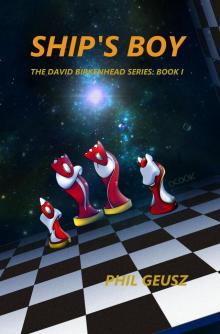 Ship's Boy
Ship's Boy Early Byrd
Early Byrd Admiral (The David Birkenhead Series)
Admiral (The David Birkenhead Series)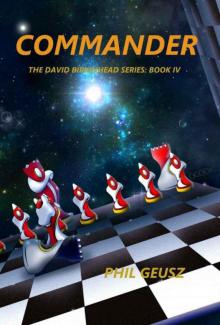 Commander
Commander Commodore (The David Birkenhead Series)
Commodore (The David Birkenhead Series)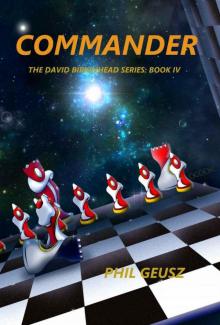 Commander (The David Birkenhead Series)
Commander (The David Birkenhead Series)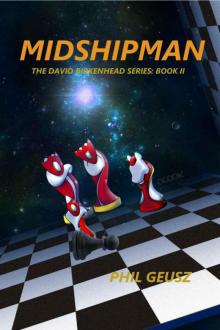 Midshipman
Midshipman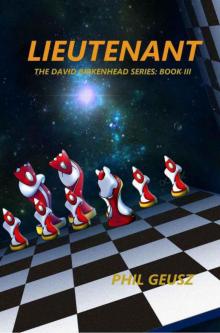 Lieutenant
Lieutenant Ship's Boy (The David Birkenhead Series)
Ship's Boy (The David Birkenhead Series)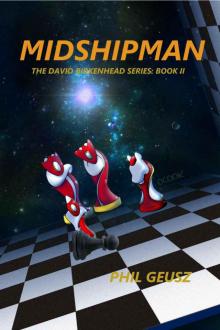 Midshipman (The David Birkenhead Series)
Midshipman (The David Birkenhead Series)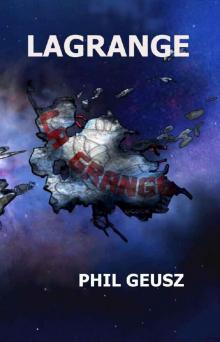 Lagrange
Lagrange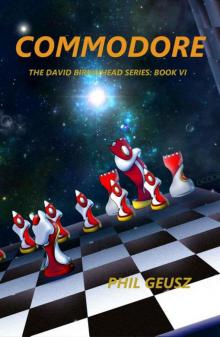 Commodore
Commodore Admiral
Admiral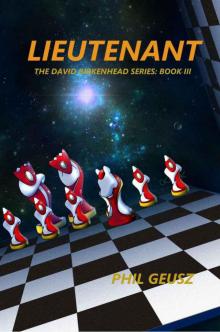 Lieutenant (The David Birkenhead Series)
Lieutenant (The David Birkenhead Series)